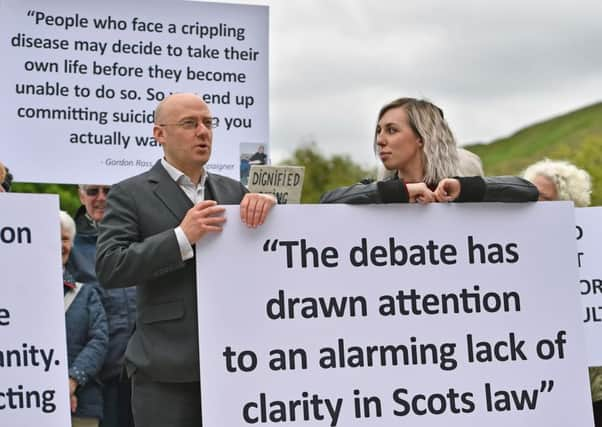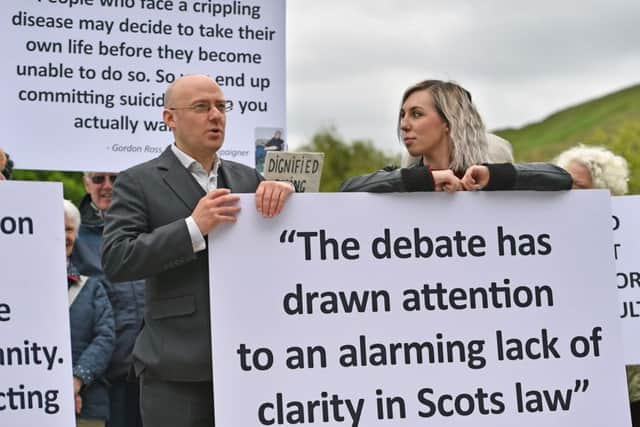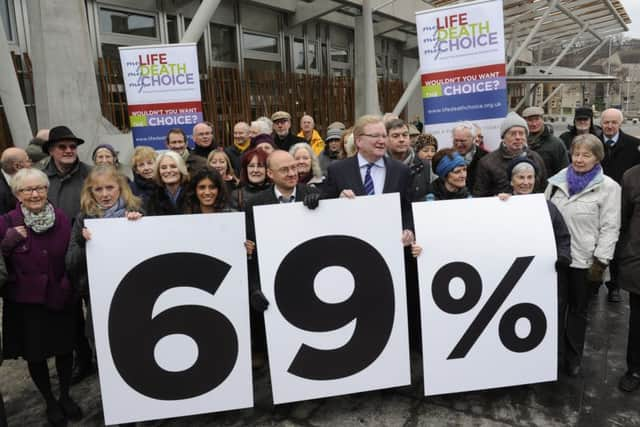Assisted suicide bill rejected at Holyrood


But support has more than doubled after 36 MSPs across all parties voted in favour of the move at Holyrood last night, while 82 opposed the plans.
The proposed legislation was brought forward by the late Margo MacDonald, who wanted to see Scotland follow the example of other European countries like Holland and Belgium.
Advertisement
Hide AdAdvertisement
Hide AdBut it provoked a fierce public debate among supporters who wanted terminally ill Scots to have the option of “dying with dignity” and opponents who branded it “state-sponsored killing.”


There were concerns among MSPs over issues such as the illnesses which would allow people to meet the criteria for state assistance to die, as well as the role of so called “friends at the end” who would assist in the process. Green MSP Patrick Harvie, the man who took over the bill after Ms MacDonald’s death, said there is still a need for the law to be clarified in Scotland.
“Clearly the detail of this bill wasn’t good enough to convince parliament, but I think it’s awoken more people to the problems of the current law,” he said.
He added that the estimated 50 people a year who are terminally ill and commit suicide do so in a “complete legal vacuum”.
“It’s unclear what actions would open to prosecution at present under the current law if somebody sought assistance to commit suicide,” he added.


MSPs were given a free “conscience” vote last night and were split across party lines. More than 20 Nationalists supported the proposals, including government ministers Richard Lochhead and Fiona MacLeod and Holyrood justice committee convener Christine Grahame. Labour’s Claudia Beamish and Elaine Murray were backers, along with Lib Dem Jim Hume.
During a lengthy debate at Holyrood, there were personal contributions from MSPs on both sides of the campaign.
SNP MSP Dennis Robertson spoke emotionally about the loss of his 18-year-old daughter Caroline, who died in 2011 after struggling with a severe eating disorder, as he said he was opposed to the bill.
Advertisement
Hide AdAdvertisement
Hide AdHe said: “She wanted to die, she said on several occasions ‘Let me die, I can’t live with this illness, you need to help me die, please help me die’. I couldn’t do that. I loved her too much. I wanted her to live.”
His party colleague George Adam spoke about his wife Stacey, who has the secondary progressive form of MS, as he urged the chamber to allow the bill to progress.
He said: “Those of you who know her, know Stacey loves life – one of her most endearing and attractive qualities is her sheer lust for life, but what happens if she’s so ill that she no longer has that quality that she currently has?’’
The My Life, My Death, My Choice group which campaigned for change said the 36 MSPs who voted in favour of change was up from the 16 who gave it their backing five years ago.
“Politicians are increasingly ill at ease with the current law surrounding assisted suicide and are beginning to catch up with the views of their constituents,” a spokesman said.
“It may be that MSPs had concerns about some of the details in this bill but the principle that a change in the law needs to be examined seriously has been established.”
Religious groups and palliative care bodies had been among those opposing the measure.
The Care Not Killing umbrella body handed in a 15,000-strong petition opposing the bill last week.
Advertisement
Hide AdAdvertisement
Hide AdConvener Dr Gordon MacDonald said last night’s vote was a “major victory” for vulnerable people in society who are most in need of protection.
He added: “The present law making assisted suicide illegal is clear and right and does not need changing.”